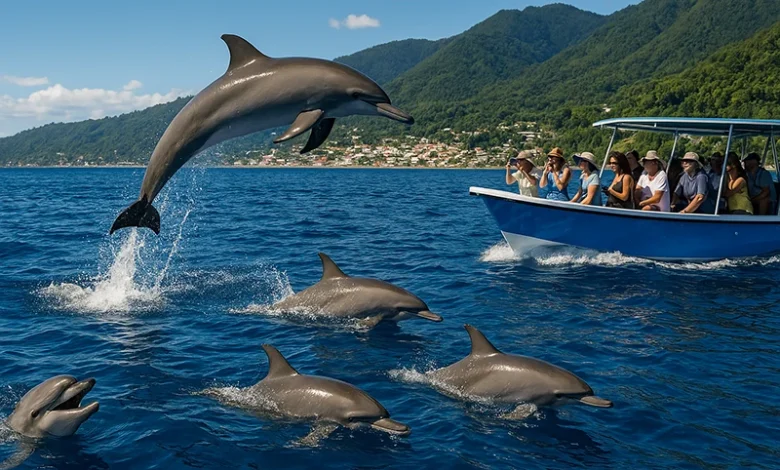Spinner Dolphins in Dominica

Spinner Dolphins in Dominica bring unmatched energy to the island’s marine world, delighting visitors with their joyful leaps and spiraling spins. These playful cetaceans, scientifically known as Stenella longirostris, are frequently spotted in pods along Dominica’s west coast, making them a highlight of the island’s vibrant marine biodiversity and marine tourism scene. Their presence adds a thrilling dimension to the Nature Isle’s standing as the Whale Watching Capital of the Caribbean.
Distinctive Behavior in Marine Ecosystems
Spinner dolphins are named for their signature aerial spins—sometimes rotating as many as seven times in a single leap. Highly social, they travel in large groups, often numbering 30 to 100, and exhibit strong pod cohesion. These behaviors are best observed near Coastal Communities like Soufrière, Scotts Head, and Portsmouth, where the deep waters of the Caribbean Sea drop off rapidly from the coastline into nutrient-rich zones perfect for hunting small fish and squid.
Their daily patterns are shaped by rest in sheltered Marine Reserves during the day, and nocturnal foraging offshore, demonstrating how they help maintain balance in Dominica’s Marine Ecosystems.
Prime Locations and Marine Reserves
Several protected zones are hotspots for Spinner Dolphin sightings, including:
- Soufrière Scotts Head Marine Reserve
- Cabrits National Park Marine Section
- Offshore waters adjacent to the Sperm Whale Reserve
These Protected Areas safeguard the dolphins’ foraging and socializing grounds, which are vital for pod survival and calf rearing.
A Pillar of Marine Tourism and the Dominica Economy
Spinner dolphins are among the most frequently encountered marine mammals during whale watching and boating tours. Their predictable surface behaviors make them a favorite of photographers, marine biologists, and eco-conscious travelers alike. Their role in attracting visitors directly supports the Dominica Economy, particularly in coastal villages that offer small-boat tours, snorkelling excursions, and swimming adventures.
As part of the island’s eco-tourism and sustainable tourism strategy, tour operators are trained to follow marine mammal interaction protocols designed by the Government of Dominica, under agencies like the Ministry of Tourism, Forestry, Wildlife & Parks Division, and Discover Dominica Authority.
Conservation and Climate Considerations
While not currently endangered, spinner dolphins are vulnerable to noise pollution, plastic debris, and ecosystem shifts brought on by climate change. To mitigate these threats, Dominica collaborates with regional partners such as the Caribbean Cetacean Society and global conservation organizations working on marine mammal protection.
Ongoing research and responsible tourism ensure that future generations can continue to experience the magic of these charismatic performers in their natural habitat.




